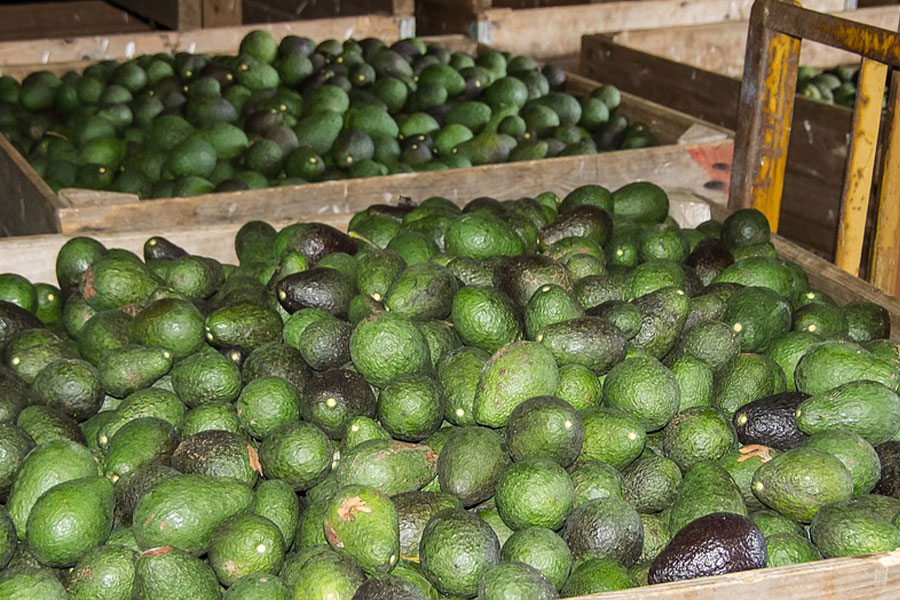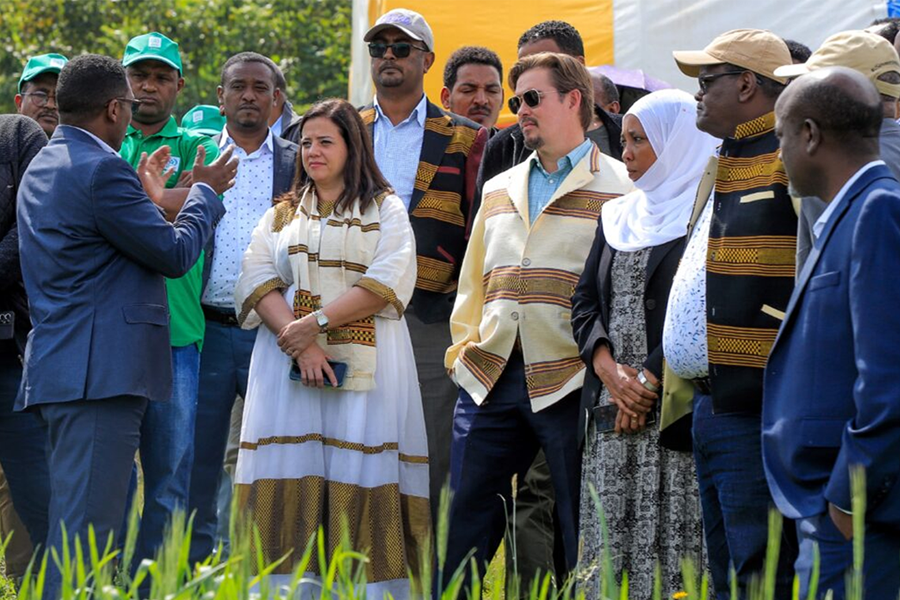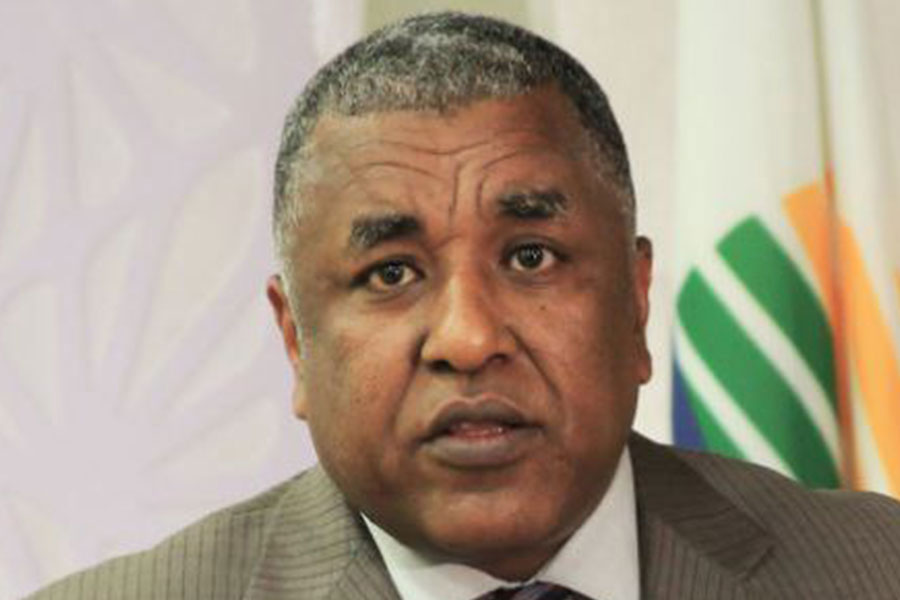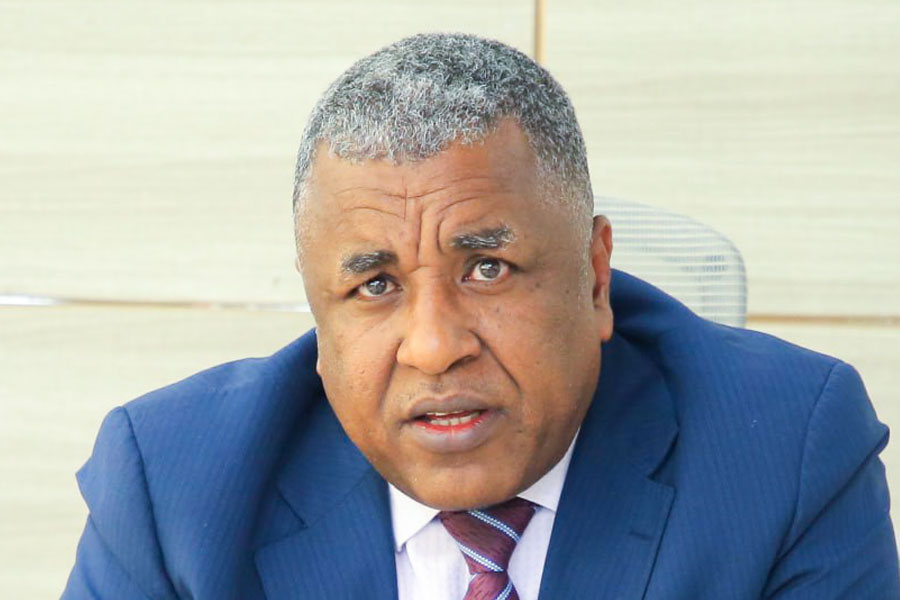
Jul 15 , 2023.
It is not often that farmers leave their fields to protest, particularly when the season happens to be ploughing. Recently, however, farmers in the Amhara Regional State, usually took to the streets of Bahir Dar city, making their grievances known.
The cause of their lament? The scarcity of fertiliser—an agricultural lifeline in a country where 70pc of the populace subsists on the whims of agriculture. It would be unwise to see this development as a simple case of supply chain hiccups. The roots of the crisis burrow deep into the country’s economic, security, and political soil.
State Minister of Agriculture, Sofia Kasa, asserted that the country required 1.9 million tonnes of fertiliser for the current farming season. Yet, procurement and distribution were lagging, owing to a depleted foreign-currency reserve, growing security threats and skyrocketing international fertiliser prices.
In the realm of economics, Ethiopia's dwindling foreign currency reserves, barely covering two weeks of imports, are hampering its ability to secure the needed fertiliser. Reliance on the state-owned Commercial Bank of Ethiopia (CBE) to marshal sufficient foreign currency for fertiliser imports has further slowed the process.
The international price of fertiliser has more than doubled in the meantime due to a global reduction in phosphate production and export restrictions from countries such as Russia and China. With the average cost of NPS fertiliser leaping from 280 dollars for a metric ton to 650 dollars, Ethiopia's bill is inevitably soaring.
The federal government imported 300,000tn less fertiliser this year compared to last, despite a bill that has ballooned by 350 million dollars on top of last year's 660 million dollars.
Policies to manage the impact of global price fluctuations on domestic farmers, such as subsidies, hedging strategies or local production of fertilisers, should be explored and implemented. Though a considerable sum, the government's current subsidy of 70 billion Br has proven insufficient in shielding farmers from global price hikes.
Yet, economics is only part of the story.
Security concerns are tightening their grip on Ethiopia's agriculture sector. Insurgencies in the Oromia and Amhara regional states, two of Ethiopia's three largest agricultural producers, make it a Sisyphean task to deliver the much-needed fertilisers, vital seeds, and pesticides in time for the farming season.
Government pledges to secure the highways and distribution outlets are increasingly being dismissed as mere platitudes in the face of unabated militarised conflicts and increasing reports of abductions and killings.
The crux of this multi-pronged crisis, however, lies in the murky political landscape. There appears to be a paradigm shift within the ruling Prosperity Party (PP), with a greater emphasis on appeasing the urban class while neglecting the rural population— a segment that constitutes more than 80pc of the population. This unbalanced attention could evolve into a dangerous gamble, given that agriculture accounts for roughly 37pc of Ethiopia's GDP. Studies commissioned by the UN Food & Agricultural Organisation (FAO) estimate that 95pc of agricultural production and 85pc of all employment remains within the agrarian community.
Acknowledging the crisis, the federal government has launched an interagency working group tasked with exploring the feasibility of allowing the private sector to import fertiliser. Yet, as the Emperors learned the hard way, the land issue and rural policies cannot be ignored when attempting to govern a restive rural Ethiopia.
It could be this underlying problem that the government must address: there is a fundamental political and ideological shift that needs to occur to address the issues farmers face.
History and experience prove the rural population cannot be left behind in any politico-economic roadmap. It significantly impacts Ethiopia's economy, contributing close to 80pc of goods for export merchandise. Farmers represent an integral part of the nation's fabric and cannot be ignored without severe consequences.
The price political elites governing the country would pay will be enormous, considering the grim realities revealed by FAO's findings. Of the 18 million farming households across the country, most depend on daily earnings of less than 0.50 dollars. FAO's researchers appear to be "unsurprised" to see rural families struggling to survive without access to seasonal wage employment or aid from the Productive Safety Net.
Current Ethiopian leaders are known to have a knack for seeing the glass half full. Indeed, Ethiopia has had remarkable social and economic progress over the past two decades, "attaining the largest absolute gains" in the UNDP's Human Development Index (HDI). The glass, however, remains half empty when looked at its HDI ranks-175th out of 191 countries.
It would be rewarding for policymakers and their political bosses to make long-term commitments to boost the well-being of the agrarian and pastoral communities, not just temporary measures addressing hiccups in importing fertilisers. They can work on having clarity on land regime issues and policies to protect the rights of farmers, as well as efforts to ensure their livelihoods are safeguarded.
The rural populace cannot be an afterthought. Ignoring this essential segment of society will not only lead to social unrest, as seen with the recent farmers' protests, but also to a decline in agricultural productivity, threatening the nation's food security.
A comprehensive, farmer-inclusive policy would help address many of the hardships farmers face. This includes providing education on the efficient use of fertilisers, investing in infrastructure to improve transport and logistics, and implementing fair trade policies to protect farmers from global price fluctuations.
They can strive to ensure political stability and security to allow farmers to work their lands without fear. Reports of escalating insecurity and violence undermine the agricultural sector and, by extension, the country's economy. Ethiopia's current crisis is a stark reminder of the interconnectedness of political stability, economic growth, and food security.
A sustained effort is needed to restore peace in the rural community, addressing the root causes of the insurgencies. Working towards a peaceful resolution should be the political priority rather than focusing solely on securing the highways and distribution outlets.
To address these intertwined issues, the incumbent party leaders can take a holistic approach that takes into account not just the immediate needs, but also the long-term sustainability of the rural community. This can convince farmers to return to their fields with the certainty that their toil will bear fruit.
It could be tempting to see the plight of Ethiopia's farmers in isolation. Undoubtedly, it serves as a barometer of the country's well-being. By addressing their concerns, though, Ethiopia's leaders could find the path away from colossal destabilisation.
PUBLISHED ON
Jul 15,2023 [ VOL
24 , NO
1211]

Commentaries | Jul 15,2023

Fortune News | May 11,2025

Radar | Oct 27,2024

Fortune News | Oct 28,2023

Fortune News | Jun 24,2023

Fortune News | May 25,2024

Fortune News | Oct 13, 2024

Radar | Jul 23,2022

Radar | Nov 26,2022

Fortune News | Jan 18,2020

My Opinion | 131673 Views | Aug 14,2021

My Opinion | 128039 Views | Aug 21,2021

My Opinion | 126001 Views | Sep 10,2021

My Opinion | 123622 Views | Aug 07,2021

Dec 22 , 2024 . By TIZITA SHEWAFERAW
Charged with transforming colossal state-owned enterprises into modern and competitiv...

Aug 18 , 2024 . By AKSAH ITALO
Although predictable Yonas Zerihun's job in the ride-hailing service is not immune to...

Jul 28 , 2024 . By TIZITA SHEWAFERAW
Unhabitual, perhaps too many, Samuel Gebreyohannes, 38, used to occasionally enjoy a couple of beers at breakfast. However, he recently swit...

Jul 13 , 2024 . By AKSAH ITALO
Investors who rely on tractors, trucks, and field vehicles for commuting, transporting commodities, and f...

Jun 29 , 2025
Addis Abeba's first rains have coincided with a sweeping rise in private school tuition, prompting the city's education...

Jun 29 , 2025 . By BEZAWIT HULUAGER
Central Bank Governor Mamo Mihretu claimed a bold reconfiguration of monetary policy...

Jun 29 , 2025 . By BEZAWIT HULUAGER
The federal government is betting on a sweeping overhaul of the driver licensing regi...

Jun 29 , 2025 . By NAHOM AYELE
Gadaa Bank has listed 1.2 million shares on the Ethiopian Securities Exchange (ESX),...